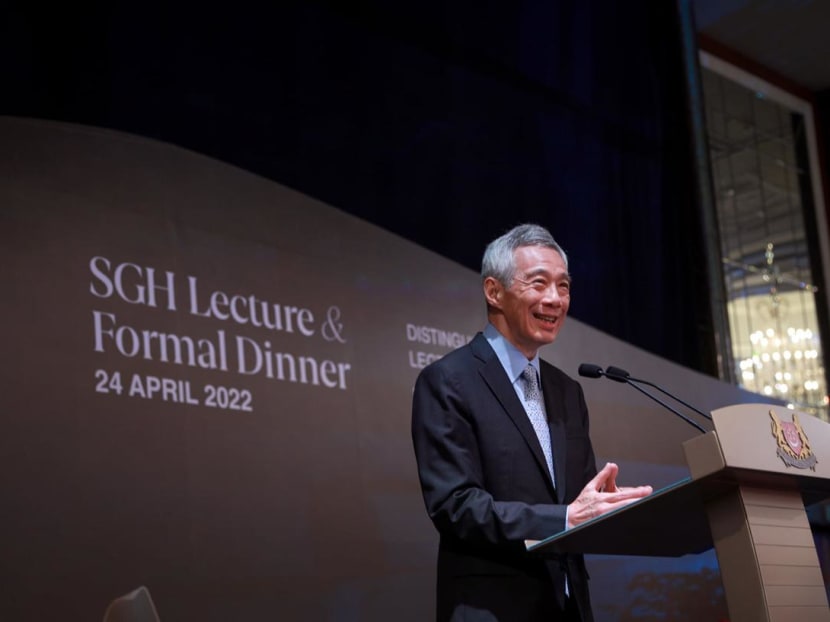Singapore cannot let valuable lessons from COVID-19, 'for which we have paid dearly', go to waste: PM Lee

Singapore Prime Minister Lee Hsien Loong delivering a speech at SGH Lecture & Formal Dinner at Shangri-La Singapore on Apr 24, 2022. (Photo: MCI)
SINGAPORE: The COVID-19 pandemic has taught Singapore valuable lessons "for which we have paid dearly" and they must not go to waste, said Prime Minister Lee Hsien Loong on Sunday (Apr 24).
Speaking at an event to mark 200 years since the establishment of Singapore General Hospital (SGH) in 1821, Mr Lee said Singapore "cannot thoughtlessly revert to the status quo ante" after the pandemic.
"We must make the most of the changes forced on us by the crisis to improve the way we do things," said the Prime Minister.
Mr Lee credited Singapore’s resilient healthcare system, an effective public health response and a high degree of public trust with making “a big difference” in weathering the pandemic.
But “while we count our blessings, we must prepare seriously for the next pandemic”, said Mr Lee.
“It is entirely possible that within the next few decades, another novel pathogen more lethal and infectious than COVID-19 will sweep the world,” he said.
This means Singapore must keep its standards for medical excellence high, by investing in healthcare workers and good medical facilities and infrastructure, Mr Lee said.
The country must also build up its scientific and biomedical capabilities to take advantage of the R&D expertise it has built up over the years, he added.
Singapore will also turn to developing public health expertise, which he described as “absolutely critical” in a pandemic.
“We need to be able to understand how a new disease is spreading, make sense of disease trends ... and devise non-medical measures that can help bring the outbreak under control in our population,” he said.
The Government will also shift its focus from hospital-centric care to patient-centred, preventive care by “tackling illness at its root, before it progresses to the point of needing treatment”, Mr Lee said.
This will address the pressing needs of the ageing population and the burden of chronic diseases on the healthcare system, Mr Lee explained.
ROLE OF TRUST
However, the most critical factor in Singapore’s pandemic response, Mr Lee said, is trust. This high degree of trust - between Singaporeans and the Government, and in one another - has been built up over the years, he said.
“It is the fundamental reason why Singaporeans were able to come together during the pandemic, instead of working against each other,” he said, pointing to how the population abided by “burdensome” safe management measures and went for vaccinations and booster jabs.
Public trust in the healthcare system is based on the competency and commitment of healthcare workers, said Mr Lee.
The transparency of the healthcare system, even when things fail to go as planned, has also played a part, he added.
He cited the example of the Ministry of Health regularly reporting statistics on serious adverse events following COVID-19 vaccination and proactively investigating any errors, such as when someone received the wrong dose.
"Some may be tempted to think that it would have been easier to keep things quiet ... but it would have been very unwise," said the Prime Minister. "Rumours will spread, people will gradually lose faith in the system and we will eventually pay a high price - the loss of public trust".
An effective public health response also helped Singapore deal with the COVID-19 crisis, Mr Lee said.
This refers to the use of public policies, including non-medical interventions, to manage the course of the pandemic and limit the spread of the virus.
Examples of such measures include isolating, contact tracing, safe management measures and cross-border restrictions.
Singapore's national vaccination programme also required many public health decisions, Mr Lee noted.
For example, decisions were made about which groups to vaccinate first, how soon to administer booster shots, and how to differentiate between the vaccinated and unvaccinated.
"Effectively integrating these public health tools and considerations with our resilient healthcare system made all the difference in this pandemic," said Mr Lee.
Mr Lee also credited Singapore's "strong and resilient" healthcare system with helping the country weather COVID-19.
Describing how Singapore has invested heavily in healthcare infrastructure, Mr Lee pointed to the construction and expansion of eight public acute and community hospitals since 2010. The number of polyclinics has also increased from 18 to 23 in the past five years.
When COVID-19 hit Singapore, hospitals built up stockpiles of essential medical supplies, ramped up intensive care unit (ICU) capacity and reorganised and mobilised resources to support the emergency departments and COVID-19 wards, Mr Lee noted.
"LUCKY BREAKS"
While the three factors - public trust, an effective health public health response and a strong healthcare system - were key for Singapore during the pandemic, there were some more fortuitous factors - "lucky breaks," Mr Lee acknowledged.
COVID-19, unlike the Spanish flu, has been less lethal for young and healthy people, and this helped to mitigate the outbreak in Singapore's migrant worker dormitories, said Mr Lee.
In addition, the emergence of "super-transmissible" variants like Delta and Omicron only came about a year or two into the pandemic, Mr Lee noted, and this meant countries were able to limit the damage, albeit after learning painful lessons.
And the "final piece of good fortune" was the availability of highly effective mRNA vaccines within a year.
This was the "result of sustained advances in biotechnology over decades, and the collective efforts of governments, international institutions, pharmaceutical firms, and universities", said Mr Lee.
"So while we count our blessings, we must prepare seriously for the next pandemic, lest we are not as lucky next time."
"CITY COMING BACK TO LIFE"
Singapore is approaching its goal of living with COVID-19, Mr Lee said, in a speech that came two days after Singapore announced major steps to roll back COVID-19 restrictions.
"You can feel the city coming back to life," he said. "We are quietly confident of dealing with whatever may come, and continuing to progress towards the new normal."
But even during the pandemic, Singapore was able to maintain a "degree of normalcy", said Mr Lee as he highlighted the role of one group of people.
"Our healthcare workers displayed professionalism and commitment, kept our healthcare system strong and resilient, and enabled Singapore to maintain a degree of normalcy in extraordinary times," he added, thanking healthcare workers for their "courage, perseverance, and commitment to the cause".
"Singapore is deeply grateful to all of you," said Mr Lee.
BOOKMARK THIS: Our comprehensive coverage of the COVID-19 pandemic and its developments
Download our app or subscribe to our Telegram channel for the latest updates on the coronavirus pandemic: https://cna.asia/telegram







